Building the Perfect Bid: What Successful Contractors Do Before They Submit a Number

Want to win more construction jobs without losing your shirt? Here’s how smart contractors build accurate, competitive bids by doing the right prep before they ever send a number.
Let’s be honest—bidding can feel like a crapshoot.
You stare at the plans, make your best guess at labor and materials, slap on a little markup, and hit send. And sometimes it works… but sometimes you win a job that ends up costing you money.
There’s a better way.
Successful contractors don’t just wing it. They build every bid with purpose. They know their costs, understand the scope, and leave as little to chance as possible. Here’s how they do it—and how you can, too.
1. Start with a Walkthrough (If You Can)
If it’s a local project and you’ve got access, always try to do a site visit. Plans are great, but nothing beats walking the property, seeing the terrain, spotting potential obstacles, and getting a gut feel for the job.
Look for:
- Access issues for equipment
- Drainage or grading problems
- Material delivery limitations
- Any red flags that could cause delays or extra work
If you can’t walk it, study the plans and photos hard. Ask questions. Make no assumptions.
2. Know the Scope—Inside and Out
Read the scope of work like your money depends on it—because it does. Don’t just skim it. Understand what’s included, what’s not, and where there might be room for interpretation.
Look for:
- Vague descriptions that could lead to “extra” requests later
- Items you’ll be expected to supply that aren’t clearly listed
- Potential add-ons that could either help or hurt you later
If something’s unclear—ask. It’s better to look thorough than to look foolish later.
3. Get Real with Your Costs
Here’s where most bids go sideways: contractors underestimate their actual job costs.
You have to know:
- Your labor rates (fully burdened)
- Material costs (current, not last year’s)
- Equipment rental fees
- Subcontractor quotes
- Fuel, delivery, and overhead
And don’t forget to factor in the stuff that adds up over time: small tools, trash haul-offs, and time spent on coordination.
With ProfitDig, you can build out your costs in real time, line by line, and see exactly where your money’s going. It beats scribbling numbers on the back of a notepad.
4. Add Your Margin—With Intention
Some guys just throw on 10% or 20% and call it good. But margin should reflect:
- Your risk level on the job
- Your backlog (are you desperate or booked solid?)
- Market competition
- How badly you want this particular job
It’s okay to flex your numbers depending on the situation—but don’t undercut yourself just to “win” the job. Winning a money-loser isn’t winning.
5. Double Check for Missing Pieces
Before you hit send, go through your bid like it’s someone else’s.
Ask yourself:
- Did I include everything the client asked for?
- Are there any gaps?
- Are all subs and suppliers covered?
- Did I account for cleanup, punch list, permits?
One missed detail can eat your entire profit margin. A second set of eyes—whether it’s your project manager, estimator, or spouse—is always a good idea.
6. Package It Professionally
You don’t have to be fancy, but your bid should be clear, complete, and professional. Break down the scope, list your assumptions, and show that you know what you’re doing.
Presentation matters—especially if you’re going up against bigger companies. A clean bid shows you’re serious and organized.
Bottom Line
Bidding isn’t about guessing. It’s about knowing—your costs, the scope, the site, and your own limits.
If you want to win jobs and actually make money on them, stop rushing through the bid process. Slow down, do the prep work, and build your numbers from the ground up.
A good bid doesn’t just win work. It protects your business.
ProfitDig makes creating professional quality job bids easy and fast!
Stop losing profit.
Build bids in minutes and track every dime with ProfitDig.
Start Risk-Free30-Day Money Back Guarantee